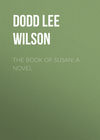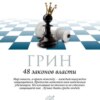Читать книгу: «The Book of Susan: A Novel», страница 3
THE SECOND CHAPTER
I
IT was not Susan who left me at the end of two weeks; it was Mrs. Parrot. Maltby had departed within three days, hastening perforce to editorial duties in New York. He then edited, with much furtive groaning to sympathetic friends, the Garden Exquisite, a monthly magazine de luxe, devoted chiefly to advertising matter, and to photographs taken – by request of far-seeing wives and daughters – at the country clubs and on the country estates of our minor millionaires. For a philosophical anarch, rather a quaint occupation! Yet one must live… Maltby, however, had threatened a return as soon as possible, "to look over the piteous débâcle." There was no probability that Mrs. Parrot would ever return.
"You cannot expect me," maintained Mrs. Parrot, "to wait on the child of a murdering suicide. Especially," she added, "when he was nothing but a common sort of man to begin with. I'm as sorry for that poor little creature as anybody in New Haven; but there are places for such."
That was her ultimatum. My reply was two weeks' notice, and a considerable monetary gift to soften the blow.
Hillhouse Avenue, in general, so far as I could discover, rather sympathized with Mrs. Parrot. She at once obtained an excellent post, becoming housekeeper for the Misses Carstairs, spinster sisters of incredible age, who lived only two doors from me in a respectable mansion whose portico resembled an Egyptian tomb. Wandering freshmen from the Yale campus frequently mistook it for the home office of one of the stealthier secret societies.
There, silently ensconced, Mrs. Parrot burned with a hard, gemlike flame, and awaited my final downfall. So did the Misses Carstairs, who, being cousins of my wife, had remained firmly in opposition. And rumor had it that other members of neighboring families were suffering discomfort from the proximity of Susan. It was as if a tiny, almost negligible speck of coal dust had blown into the calm, watchful eye of the genius loci, and was gradually inflaming it – with resultant nervous irritation to all its members.
Susan was happily unconscious of these things. Her gift of intuition had not yet projected itself into that ethereal region which conserves the more tenuous tone and the subtler distinction – denominate "society." For the immediate moment she was bounded in a nutshell, yet seemed to count herself a princess of infinite space – yes, in spite of bad dreams. We – Doctor Stevens and I – had put her to bed in the large, coolly distinguished corner room formerly occupied by Gertrude. This room opened directly into my own. Doctor Stevens counselled bed for a few days, and Susan seemed well content to obey his mandate. Meanwhile, I had requested Mrs. Parrot to buy various necessities for her – toothbrushes, nightdresses, day dresses, petticoats, and so on. Mrs. Parrot had supposed I should want the toilet articles inexpensive, and the clothing plain but good.
"Good, by all means, Mrs. Parrot," I had corrected, "but not plain. As pretty and frilly as possible!"
Mrs. Parrot had been inclined to argue the matter.
"When that poor little creature goes from here," she had maintained, "flimsy, fussy things will be of no service to her. None. She'll need coarse, substantial articles that will bear usage."
"Do you like to wear coarse, substantial articles, Mrs. Parrot?" I had mildly asked. "So far as I am permitted to observe – "
Mrs. Parrot had resented the implication. "I hope in my outer person, Mr. Hunt, that I show a decent respect for my employers, but I've never been one to pamper myself on linjery, if I may use the word – not believing it wholesome. Nor to discuss it with gentlemen. But if I don't know what it's wisest and best to buy in this case, who," she had demanded of heaven, "does?"
"Possibly," heaven not replying, had been my response, "I do. At any rate, I can try."
It was fun trying. I ran down on the eight o'clock to New York and strolled up and down Fifth Avenue, shopping here and there as the fancy moved me. Shopping – with a well-filled pocketbook – is not a difficult art. Women exaggerate its difficulties for their own malign purposes. In two hours of the most casual activity I had bought a great number of delightful things – for my little daughter, you know. Her age?.. Oh, well – I should think about fourteen. Let's call it 'going on fourteen.' Then it's sure to be all right.
It was all right – essentially. By which I mean that the parties of the first and second parts – to wit, Susan and I – were entirely and blissfully satisfied.
Susan liked particularly a lacy sort of nightgown all knotted over with little pink ribbony rosebuds; there was a coquettish boudoir cap to match it – suggestive somehow of the caps village maidens used to wear in old-fashioned comic operas; and a pink silk kimono embroidered with white chrysanthemums, to top off the general effect. Needless to say, Mrs. Parrot disapproved of the general effect, deeming it, no doubt with some reason, a thought flamboyant for Gertrude's coolly distinguished corner room.
But Susan, propped straight up by now against pillows, wantoned in this finery. She would stroke the pink silk of the kimono with her thin, sensitive fingers, sigh deeply, happily, then close her eyes.
There was nothing much wrong with her. The green-and-purple bruise on her cheek – a somber note which would not harmonize with the frivolity of the boudoir cap – was no longer painful. But, as Doctor Stevens put it, "The little monkey's all in." She was tired, tired out to the last tiny filament of her tiniest nerve..
During those first days with me she asked no awkward questions; and few of any kind. Indeed, she rarely spoke at all, except with her always-speaking black eyes. For the time being the restless-terrier-look had gone from them; they were quiet and deep, and said "Thank you," to Doctor Stevens, to Mrs. Parrot, to me, with a hundred modulating shades of expression. In spite of a clear-white, finely drawn face, against which the purple bruise stood out in shocking relief; in spite of entirely straight but gossamery black hair; in spite of a rather short nose and a rather wide mouth – there was a fascination about the child which no one, not even the hostile Mrs. Parrot, wholly escaped.
"That poor, peeny little creature," admitted Mrs. Parrot, on the very morning she left me, "has a way of looking at you – so you can't talk to her like you'd ought to. It's somebody's duty to speak to her in a Christian spirit. She never says her prayers. Nor mentions her father. And don't seem to care what's happened to him, or why she's here, or what's to come to her. And what is to come to her," demanded Mrs. Parrot, "if she stays on in this house, without a God-fearing woman, and one you can't fool most days? Not that I could be persuaded, having made other arrangements. And if I may say a last word, the wild talk I've heard here isn't what I've been used to. Nor to be approved of. No vulgarity. None. I don't accuse. But free with matters better left to the church; or in the dark – where they belong. All I hold is, that some things are sacred, and some unmentionable; and conversation should take cognizance of such!"
I had never known her so moved or so eloquent. I strove to reassure her.
"You are quite right, Mrs. Parrot. I apologize for any painful moments my friends and I have given you. But don't worry too much about Susan. So far as Susan's concerned, I promise to 'take cognizance' in every possible direction."
It was clear to me that I should have to expend a good deal of care upon engaging another housekeeper at once. And, of course, a governess – for lessons and things. And a maid? Yes; Susan would need a maid, if only to do her mending. Obviously, neither the housekeeper, the governess, nor I could be expected to take cognizance of that.
II
But I anticipate. Two weeks before Mrs. Parrot's peroration, on the very evening of the day Maltby Phar had left me, Susan and I had had our first good talk together. My memorable shopping tour had not yet come off, and Susan, having pecked birdlike at a very light supper, was resting – semi-recumbent – in bed, clothed in a suit of canary-yellow pajamas, two sizes too big for her, which I was rather shaken to discover belonged to Nora, my quiet little Irish parlor maid. I had not supposed that Nora indulged in night gear filched from musical comedy. However, Nora had meant to be kind in a good cause; though canary yellow is emphatically a color for the flushed and buxom and should never be selected for peeny, anemic little girls. It did make Susan look middling ghastly, as if quarantined from all access to Hygeia, the goddess! Perhaps that is why, when I perched beside her on the edge of Gertrude's colonial four-poster, I felt an unaccustomed prickling sensation back of my eyes.
"How goes it, canary bird?" I asked, taking the thin, blue-threaded hand that lay nearest to me.
Susan's fingers at once curled trustfully to mine, and there came something very like a momentary glimmer of mischief into her dark eyes.
"If I was an honest-to-God canary, I could sing to you," said Susan. "I'd like to do something for you, Mr. Hunt. Something you'd like, I mean."
"Well, you can, dear. You can stop calling me 'Mr. Hunt'! My first name's pretty awkward, though. It's Ambrose."
For an instant Susan considered my first name, critically, then very slowly shook her head. "It's a nice name. It's too nice, isn't it – for every day?"
I laughed. "But it's all I have, Susan. What shall we do about it?"
Then Susan laughed, too; it was the first time I had heard her laugh. "I guess your mother was feeling kind of stuck up when she called you that!"
"Most mothers do feel kind of stuck up over their first babies, Susan."
She considered this, and nodded assent, "But it's silly of them, anyway," she announced. "There are so many babies all the time, everywhere. There's nothing new about babies, Ambo."
"Aha!" I exclaimed. "You knew from the first how to chasten my stuck-up name, didn't you? 'Ambo' is a delightful improvement."
"It's more like you," said Susan, tightening her fingers briefly on mine.
And presently she closed her eyes. When, after a long still interval, she opened them, they were cypress-shaded pools.
"Tell me what happened, Ambo."
"He's dead, Susan. Pearl's dead, too."
She closed her eyes again, and two big tears slipped out from between her lids, wetting her thick eyelashes and staining her bruised and her pallid cheek.
"He couldn't help it. He was made like that, inside. He was no damn good, Ambo. That's what he was always saying to Pearl – 'You're no damn good.' She wasn't, either. And he wasn't, much. I guess it's better for him and Pearl to be dead."
This – and the two big tears – was her good-by to Bob, to Pearl, to the four-room house; her good-by to Birch Street. It shocked me at the time. I released her hand and stood up to light a cigarette – staring the while at Susan. Where had she found her precocious brains? And had she no heart? Had something of Bob's granitic harshness entered into this uncanny, this unnatural child? Should I live to regret my decision to care for her, to educate her? When I died, would she say – to whom? – "I guess it's better for him to be dead. Poor Ambo! He was no damn good."
But even as I shuddered, I smiled. For, after all, she was right; the child was right. She had merely uttered, truthfully, thoughts which a more conventional mind, more conventionally disciplined, would have known how to conceal – yes, to conceal even from itself. Genius was very like that.
"Susan!" I suddenly demanded. "Have you any relatives who will try to claim you?"
"Claim me?"
"Yes. Want to take care of you?"
"Mamma's sister-in-law lives in Hoboken," said Susan. "But she's a widow; and she's got seven already."
"Would you like to stay here with me?"
For all answer she flopped sidelong down from the pillows and hid her bruised face in the counterpane. Her slight, canary-clad shoulders were shaken with stifled weeping.
"That settles it!" I affirmed. "I'll see my lawyer in the morning, and he'll get the court to appoint me your guardian. Come now! If you cry about it, I'll think you don't want me for guardian. Do you?"
She turned a blubbered, wistful face toward me from the counterpane. Her eyes answered me. I leaned over, smoothed a pillow and slipped it beneath her tired head, then kissed her unbruised cheek and walked quietly back into my own room – where I rang for Mrs. Parrot.
When she arrived, "Mrs. Parrot," I suggested, "please make Susan comfortable for the night, will you? And I'll appreciate it if you treat her exactly as you would my own child."
It took Mrs. Parrot at least a minute to hit upon something she quite dared to leave with me.
"Very well, Mr. Hunt. Not having an own child, and not knowing – you can say that. Not that it's the same thing, though you do say it! But I'll make her comfortable – and time tells. In darker days, I hope you'll be able to say that poor, peeny little creature has done the same by you."
"Thank you, Mrs. Parrot. Good-night."
"A good night to you, Mr. Hunt," elaborated Mrs. Parrot, not without malice; "many of them, Mr. Hunt; many of them, I'm sure."
III
By the time Mrs. Parrot left us, housekeeper, governess, and maid had been obtained in New York through agencies of the highest respectability.
Miss Goucher, the housekeeper, proved to be a tall, big-framed spinster, rising fifty; a capable, taciturn woman with a positive talent for minding her own affairs. She had bleak, light-gray eyes, a rudderlike nose, and a harsh, positive way of speech that was less disagreeable than it might have been, because she so seldom spoke at all. Having hoped for a more amiable presence, I was of two minds over keeping her; but she took charge of my house so promptly and efficiently, and effaced herself so thoroughly – a difficult feat for so definite a figure – that in the end there was nothing I could complain of; and so she stayed.
Miss Disbrow on the other hand, who came as governess, was all that I had dared to wish for; a graceful, light-footed, soft-voiced girl – she was not yet thirty – with charming manners, a fluent command of the purest convent-taught French, a nice touch on the piano, and apparently some slight acquaintance with the solider branches. Merely to associate with Miss Disbrow would, I felt, do much for Susan.
I was less certain about Sonia, the maid. I had asked for a middle-aged English maid. Sonia was Russian, and she was only twenty-three. But she was sent directly to me from service with Countess Dimbrovitski – formerly, as you know, Maud Hochstetter, of Omaha – and brought with her a most glowing reference for skill, honesty, and unfailing tact. Countess Dimbrovitski did not explain in the reference, dated from Newport, why she had permitted this paragon to slip from her; nor did it occur to me to investigate the point. But Sonia later explained it all, in intimate detail, to Susan – as we shall see.
I had feared that Susan might be at first a little bewildered by the attentions of Sonia and of Miss Disbrow; so I explained the unusual situation to Miss Goucher and Miss Disbrow – with certain reservations – and asked them to make it clear to Sonia. Miss Goucher merely nodded, curtly enough, and said she understood. Miss Disbrow proved more curious and more voluble.
"How wonderful of you, Mr. Hunt!" she exclaimed. "To take in a poor little waif and do all this for her! Personally, I count it a privilege to be allowed some share in so generous an action. Oh, but I do – I do. One likes to feel, even when forced to work for one's living, that one has some little opportunity to do good in the world. Life isn't," asked Miss Disbrow, "all money-grubbing and selfishness, is it?" And as I found no ready answer, she concluded: "But I need hardly ask that of you!"
For the fleetingest second I found myself wondering whether Miss Disbrow, deep down in her hidden heart, might not be a minx. Yet her glance, the happiest mixture of frankness, timidity, and respectful admiration, disarmed me. I dismissed the unworthy suspicion as absurd.
I was a little troubled, though, when Susan that same evening after dinner came to me in the library and seated herself on a low stool facing my easy-chair.
"Ambo," she said, "I've been blind as blind, haven't I?"
"Have you?" I responded. "For a blind girl, it's wonderful how you find your way about!"
"But I'm not joking – and that's just it," said Susan.
"What's wrong, dear?" I asked. "I see something is."
"Yes. I am. The wrongest possible. I've just dumped myself on you, and stayed here; and – and I've no damn business here at all!"
"I thought we were going to forget the damns and hells, Susan?"
"We are," said Susan, coloring sharply and looking as if she wanted to cry. "But when you've heard them, and worse, every minute all your life – it's pretty hard to forget. You must scold me more!" Then with a swift movement she leaned forward and laid her cheek on my knee. "You're too good to me, Ambo. I oughtn't to be here – wearing wonderful dresses, having a maid to do my hair and – and polish me and button me and mend me. I wasn't meant to have an easy time; I wasn't born for it. First thing you know, Ambo, I'll get to thinking I was – and be mean to you somehow!"
"I'll risk that, Susan."
"Yes, but I oughtn't to let you. I could learn to be somebody's maid like Sonia; and if I study hard – and I'm going to! – some day I could be a governess like Miss Disbrow; only really know things, not just pretend. Or when I'm old enough, a housekeeper like Miss Goucher! That's what you should make me do – work for you! I can clean things better than Nora now; I never skip underneaths. Truly, Ambo, it's all wrong, my having people work for me – at your expense. I know it is! Miss Disbrow made it all clear as clear, right away."
"What! Has Miss Disbrow been stuffing this nonsense into your head!" I was furious.
"Oh, not in words!" cried Susan. "She talks just the other way. She keeps telling me how fortunate I am to have a guardian like you, and how I must be so careful never to annoy you or make you regret what you've done for me. Then she sighs and says life is very hard and unjust to many girls born with more advantages. Of course she means herself, Ambo. You see, she hates having to work at all. She's much nicer to look at and talk to, but she reminds me of Pearl. She's no damn – she's no good, Ambo dear. She's hard where she ought to be soft, and soft where she ought to be hard. She tries to get round people, so she can coax things out of them. But she'll never get round Miss Goucher, Ambo – or me." And Susan hesitated, lifting her head from my knee and looking up at me doubtfully, only to add, "I – I'm not so sure about you."
"Indeed. You think, possibly, Miss Disbrow might get round me, eh?"
"Well, she might – if I wasn't here," said Susan. "She might marry you."
My explosion of laughter – I am ordinarily a quiet person – startled Susan. "Have I said something awful again?" she cried.
"Dreadful!" I sputtered, wiping my eyes. "Why, you little goose! Don't you see how I need you? To plumb the depths for me – to protect me? I thought I was your guardian, Susan; but that's just my mannish complacency. I'm not your guardian at all, dear. You're mine."
But I saw at once that my mirth had confused her, had hurt her feelings… I reached out for her hands and drew her upon my knees.
"Susan," I said, "Miss Disbrow couldn't marry me even if she got round me, and wanted to. You see, I have a wife already."
Susan stared at me with wide, frightened eyes. "You have, Ambo? Where is she?"
"She left me two years ago."
"Left you?" It was evident that she did not understand. "Oh – what will she say when she comes home and finds me here? She won't like it; she won't like me!" wailed Susan. "I know she won't."
"Hush, dear. She's not coming home again. She made up her mind that she couldn't live with me any more."
"What's her name?"
"Gertrude."
"Why couldn't she live with you, Ambo?"
"She said I was cruel to her."
"Weren't you good to her, Ambo? Why? Didn't you like her?"
The rapid questions were so unexpected, so searching, that I gasped. And my first impulse was to lie to Susan, to put her off with a few conventional phrases – phrases that would lead the child to suppose me a wronged, lonely, broken-hearted man. This would win me a sympathy I had not quite realized that I craved. But Susan's eyes were merciless, and I couldn't manage it. Instead, I surprised myself by blurting out: "That's about it, Susan. I didn't like her – enough. We couldn't hit it off, somehow. I'm afraid I wasn't very kind."
Instantly Susan's thin arms went about my neck, and her cheek was pressed tight to mine.
"Poor Ambo!" she whispered. "I'm so sorry you weren't kind. It must hurt you so." Then she jumped from my knees.
"Ambo!" she demanded. "Is my room —her room? Is it?"
"Certainly not. It isn't hers any more. She's never coming back, I tell you. She put me out of her life once for all; and God knows I've put her out of mine!"
"If you can't let me have another room, Ambo – I'll have to go."
"Why? Hang it all, Susan, don't be silly! Don't make difficulties where none exist! What an odd, overstrained child you are!" I was a little annoyed.
"Yes," nodded Susan gravely, "I see now why Gertrude left you. But she must be awfully stupid not to know it's only your outside that's made like that!"
Next morning, without a permissive word from me, Susan had Miss Goucher move all her things to a small bedroom at the back of the house, overlooking the garden. This silent flitting irritated me not a little, and that afternoon I had a frank little talk with Miss Disbrow – franker, perhaps, than I had intended. Miss Disbrow at once gave me notice, and left for New York within two hours, letting it be known that she expected her trunks to be sent after her.
"Gutter-snipes are not my specialty," was her parting word.































